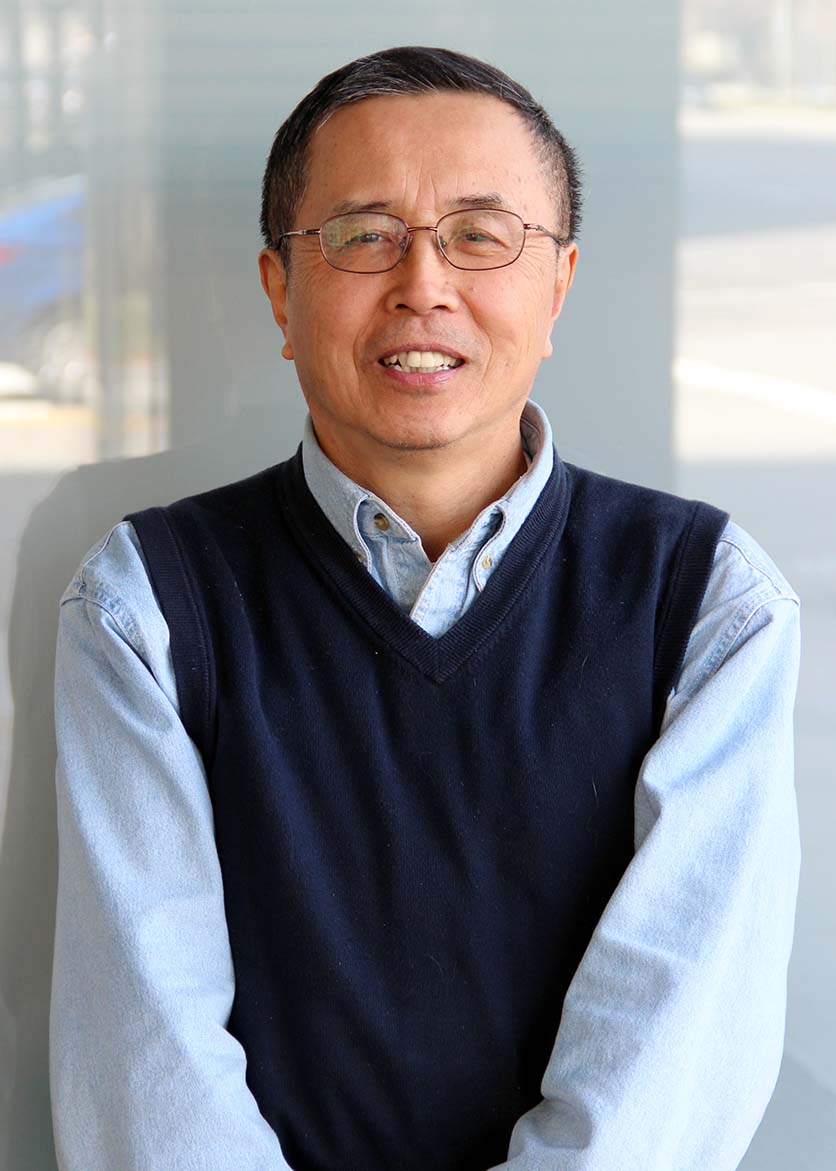You’re accessing archived content
This is archived content from the UIT website. Information may be outdated, and links may no longer function. Please contact stratcomm@it.utah.edu if you have any questions about archived content.
Once a farmer and chemical engineer, Dr. Joey Yang now loves fixing problems — from troubled computers to broken refrigerators and cars

Joey Yang, systems administrator,
Campus Computer Support
From his youth in northeast China and advanced educational training in Germany to his graduate studies at the University of Utah and decision to live and work in Utah, Dr. Joey Yang says he has had good luck everywhere he goes.
But it’s probably less about luck and more because he’s a genuinely humble, hard-working person.
Without a doubt, Yang’s upbringing during the Cultural Revolution in China contributed to his strong character. After graduating high school, Yang spent five years in the countryside, where he farmed from 3:00 a.m. until it was so dark he could not see enough to work the fields anymore.
“That's pure labor — no machines at all,” the Campus Computer Support systems administrator said. “We did everything by hand, very much like the original style of the farmer.”
Yang said the training — so-called re-education required under a Maoist policy — was hard, but he cherishes it because the experience helped him build the strength to face different situations and difficulties.
After his time in the countryside, Yang passed the country’s examination for college, becoming part of the first generation after the Cultural Revolution to attend university, where he continued to train his mind and body. While studying chemical engineering, he would get up at 5:00 a.m. to run 5 miles — no matter the weather. In winter, that sometimes meant braving minus 20 degree temperatures, a routine that earned him the nickname “polar dog.”
“My classmate called me polar dog because I am not big like a bear but sustain the cold very well,” he shared.
After earning his bachelor’s degree, Yang flew to Frankfurt, Germany, to study coal liquefaction at the Technische Hochschule Darmstadt, now known as the Technische Universität Darmstadt. But it wasn’t long before an opportunity at the University of Utah came up and he moved to Utah. Yang said his U graduate research group under Dr. Wendell H. Wiser had a phase two, $2 million fund from the Department of Energy (DOE) to study everything from coal liquefaction fundamentals to large-scale use.
After he earned his Ph.D., however, the DOE changed its energy conversion policy and job opportunities disappeared.
“At that time in the U.S., there was no commercial plant for [coal liquefaction]; it was our fundamental research,” he said. “So, there was no research facility, no university … and oil companies like Exxon and Shell, they were located far away from Utah.”
And Yang did not want to leave the state.
“I love the Utah mountains and lakes. … And no matter where I go, I just miss Utah so much,” he said. “I’ve told people, this is the place. This is the first place, and so far, it's the only place.”
So he completed the Microsoft Certified Solutions Expert (MCSE) Certification program and jumped into IT, starting with Netgear tech support just before the dotcom bubble exploded. The transition, Yang said, wasn’t all that difficult. During his U graduate studies, he worked extensively on computers for design and research purposes, as well as data management and analysis. And he credits his engineering background for his ability to quickly troubleshoot problems.
“I did so much research, I know how to narrow down the focus,” said Yang, who joined the U about 15 years ago after working for various private IT companies. “So, when we run into [an IT] problem, I know how to just quickly narrow down to the source of it.”
And quickly fixing problems makes people happy, which makes him happy.
Not surprisingly, Yang considers himself a bit of a handyman, repairing anything that breaks at home.
“As soon as I find a problem, I want to fix it. And no matter what it is, just by reading, by researching, I figure out [how to fix the problem], like how to repair a refrigerator,” he said. “I'm proud of that.”
About that refrigerator, instead of paying $600-$1,500 for someone else to fix it, he Googled instructions, ordered parts, and swapped them out with the broken components. As his wife, Liping, pointed out, there’s no need to pay others or purchase new things when Yang can fix them.
He’s also a bit of a mechanic, from changing his own oil to replacing the engine on a Toyota RAV4 after a car crash.
But most importantly, he’s a father and a son who’s never forgotten where he came from. When his parents were alive, Yang and his wife tried to visit China at least once a year; now, they go to visit his 90-year-old father-in-law. He’s also teaching his daughters, Fan and Lya, the value of family and tradition.
“I’ve always told my kids, we should do whatever we can to make the whole family concerned for each other, help each other, and care for each other.”
If only his two cats, Oliver and Fiona, which always seem at odds, would listen.
Node 4
Our monthly newsletter includes news from UIT and other campus/ University of Utah Health IT organizations, features about UIT employees, IT governance news, and various announcements and updates.
